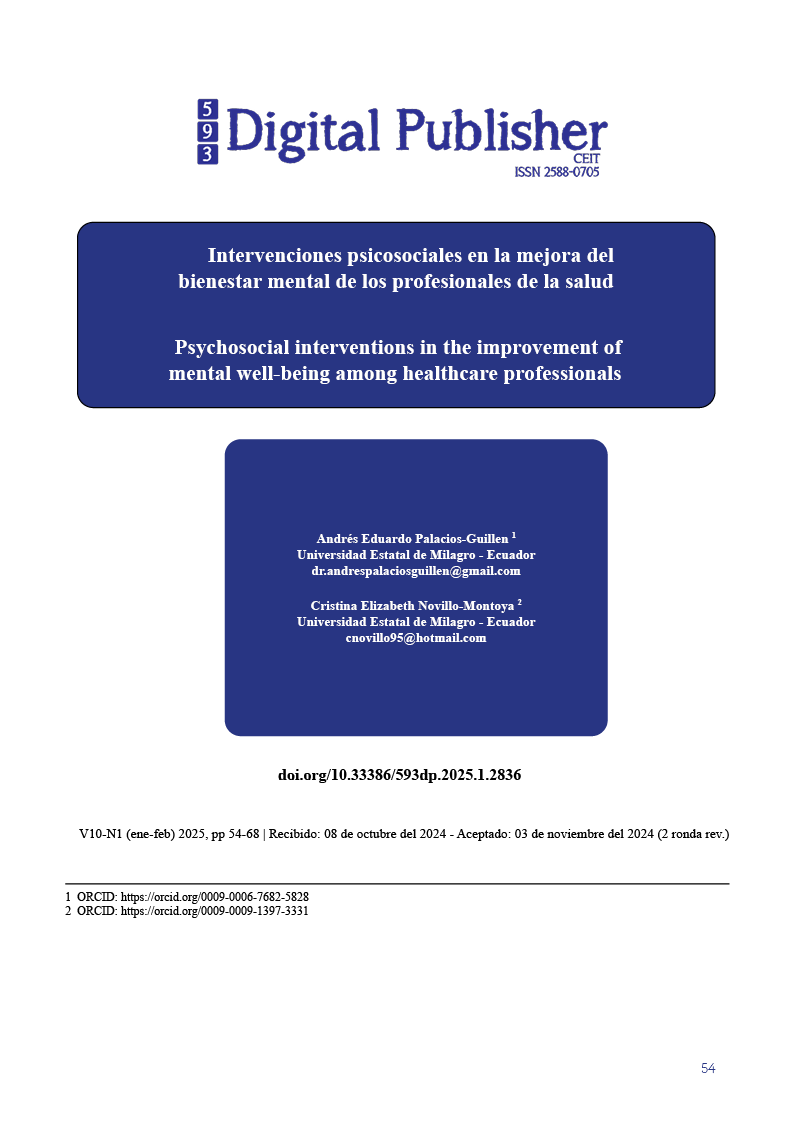Intervenciones psicosociales en la mejora del bienestar mental de los profesionales de la salud
Contenido principal del artículo
Resumen
El bienestar mental de los profesionales de la salud se ha visto comprometido por el incremento de estrés y burnout, destacándose la importancia de intervenciones psicosociales efectivas que aborden estos problemas. El objetivo de este estudio fue analizar las intervenciones psicosociales más efectivas para mejorar el bienestar mental de los profesionales de la salud. La investigación adoptó un enfoque cualitativo, sustentado en una revisión documental, lo que permitió evaluar estudios recientes sobre la efectividad de estas intervenciones en diversos contextos clínicos. Los resultados evidencian que la terapia cognitivo-conductual, el apoyo psicológico y los programas de bienestar integral son efectivos en reducir el estrés y el burnout. Sin embargo, el impacto de cada intervención varía en función del contexto clínico y la personalización de la intervención. La terapia cognitivo-conductual se destaca en la reducción de la ansiedad en entornos de alta presión, mientras que el apoyo psicológico resulta particularmente beneficioso en ambientes hospitalarios debido a su flexibilidad para adaptarse a situaciones de alta carga emocional. Por su parte, los programas de bienestar integral son idóneos para la atención primaria, pues contribuyen significativamente al bienestar general y la reducción del burnout.Se concluye que es esencial personalizar las intervenciones y adaptarlas a las características ocupacionales para optimizar su efectividad. Futuros estudios deben profundizar en la adaptación de estas intervenciones para maximizar su impacto en la salud mental de los profesionales.
Descargas
Detalles del artículo

Esta obra está bajo una licencia internacional Creative Commons Atribución-NoComercial-CompartirIgual 4.0.
1. Derechos de autor
Las obras que se publican en 593 Digital Publisher CEIT están sujetas a los siguientes términos:
1.1. 593 Digital Publisher CEIT, conserva los derechos patrimoniales (copyright) de las obras publicadas, favorece y permite la reutilización de las mismas bajo la licencia Licencia Creative Commons 4.0 de Reconocimiento-NoComercial-CompartirIgual 4.0, por lo cual se pueden copiar, usar, difundir, transmitir y exponer públicamente, siempre que:
1.1.a. Se cite la autoría y fuente original de su publicación (revista, editorial, URL).
1.1.b. No se usen para fines comerciales u onerosos.
1.1.c. Se mencione la existencia y especificaciones de esta licencia de uso.
Citas
Ahola, K., Toppinen-Tanner, S., & Seppänen, J. (2017). Interventions to alleviate burnout symptoms and to support return to work among employees with burnout: Systematic review and meta-analysis. Burnout Research, 4, 1–11. https://doi.org/10.1016/j.burn.2017.02.001
Albott, C. S., Wozniak, J. R., McGlinch, B. P., Wall, M. H., Gold, B. S., & Vinogradov, S. (2020). Battle Buddies: Rapid Deployment of a Psychological Resilience Intervention for Health Care Workers During the COVID-19 Pandemic. Anesthesia & Analgesia, 131(1), 43–54. https://doi.org/10.1213/ANE.0000000000004912
Andermo, S., Hallgren, M., Nguyen, T.-T.-D., Jonsson, S., Petersen, S., Friberg, M., Romqvist, A., Stubbs, B., & Elinder, L. S. (2020). School-related physical activity interventions and mental health among children: a systematic review and meta-analysis. Sports Medicine - Open, 6(1), 25. https://doi.org/10.1186/s40798-020-00254-x
Barattucci, M., Padovan, A. M., Vitale, E., Rapisarda, V., Ramaci, T., & De Giorgio, A. (2019). Mindfulness-Based IARA Model® Proves Effective to Reduce Stress and Anxiety in Health Care Professionals. A Six-Month Follow-Up Study. International Journal of Environmental Research and Public Health, 16(22), 4421. https://doi.org/10.3390/ijerph16224421
Berto, R. (2014). The Role of Nature in Coping with Psycho-Physiological Stress: A Literature Review on Restorativeness. Behavioral Sciences, 4(4), 394–409. https://doi.org/10.3390/bs4040394
Buselli, R., Corsi, M., Veltri, A., Baldanzi, S., Chiumiento, M., Lupo, E. Del, Marino, R., Necciari, G., Caldi, F., Foddis, R., Guglielmi, G., & Cristaudo, A. (2021). Mental health of Health Care Workers (HCWs): a review of organizational interventions put in place by local institutions to cope with new psychosocial challenges resulting from COVID-19. Psychiatry Research, 299, 113847. https://doi.org/10.1016/j.psychres.2021.113847
Carlbring, P., Andersson, G., Cuijpers, P., Riper, H., & Hedman-Lagerlöf, E. (2018). Internet-based vs. face-to-face cognitive behavior therapy for psychiatric and somatic disorders: an updated systematic review and meta-analysis. Cognitive Behaviour Therapy, 47(1), 1–18. https://doi.org/10.1080/16506073.2017.1401115
Cevallos Zambrano, D. P., Moreira-Choez, J. S., Lamus de Rodríguez, T. M., & Sánchez-Urdaneta, A. B. (2023). Psychosocial effects of COVID-19 in Ecuadorian university professors. Revista de Ciencias Sociales, 29(2), 15–31. https://doi.org/10.31876/rcs.v29i2.39960
Chen, K. W., Berger, C. C., Manheimer, E., Forde, D., Magidson, J., Dachman, L., & Lejuez, C. W. (2012). Meditative therapies for reducing anxiety: a systematic review and meta-analysis of randomized controlled trials. Depression and Anxiety, 29(7), 545–562. https://doi.org/10.1002/da.21964
Cleary, M., Kornhaber, R., Thapa, D. K., West, S., & Visentin, D. (2018). The effectiveness of interventions to improve resilience among health professionals: A systematic review. Nurse Education Today, 71, 247–263. https://doi.org/10.1016/j.nedt.2018.10.002
Damschroder, L. J., Aron, D. C., Keith, R. E., Kirsh, S. R., Alexander, J. A., & Lowery, J. C. (2009). Fostering implementation of health services research findings into practice: a consolidated framework for advancing implementation science. Implementation Science, 4(1), 50. https://doi.org/10.1186/1748-5908-4-50
De castella, K., Goldin, P., Jazaieri, H., Ziv, M., Heimberg, R. G., & Gross, J. J. (2014). Emotion beliefs in social anxiety disorder: Associations with stress, anxiety, and well‐being. Australian Journal of Psychology, 66(2), 139–148. https://doi.org/10.1111/ajpy.12053
Deeks, J., Dinnes, J., D’Amico, R., Sowden, A., Sakarovitch, C., Song, F., Petticrew, M., & Altman, D. (2003). Evaluating non-randomised intervention studies. Health Technology Assessment, 7(27). https://doi.org/10.3310/hta7270
Drennan, L. T., McConnell, A., & Stark, A. (2014). Risk and Crisis Management in the Public Sector. Routledge. https://doi.org/10.4324/9781315816456
Duarte, J., & Pinto-Gouveia, J. (2016). Effectiveness of a mindfulness-based intervention on oncology nurses’ burnout and compassion fatigue symptoms: A non-randomized study. International Journal of Nursing Studies, 64, 98–107. https://doi.org/10.1016/j.ijnurstu.2016.10.002
Ebert, D. D., Van Daele, T., Nordgreen, T., Karekla, M., Compare, A., Zarbo, C., Brugnera, A., Øverland, S., Trebbi, G., Jensen, K. L., Kaehlke, F., & Baumeister, H. (2018). Internet- and Mobile-Based Psychological Interventions: Applications, Efficacy, and Potential for Improving Mental Health. European Psychologist, 23(2), 167–187. https://doi.org/10.1027/1016-9040/a000318
Fish, J., Brimson, J., & Lynch, S. (2016). Mindfulness Interventions Delivered by Technology Without Facilitator Involvement: What Research Exists and What Are the Clinical Outcomes? Mindfulness, 7(5), 1011–1023. https://doi.org/10.1007/s12671-016-0548-2
Geraghty, K., Jason, L., Sunnquist, M., Tuller, D., Blease, C., & Adeniji, C. (2019). The ‘cognitive behavioural model’ of chronic fatigue syndrome: Critique of a flawed model. Health Psychology Open, 6(1). https://doi.org/10.1177/2055102919838907
Gharaati Sotoudeh, H., Alavi, S. S., Akbari, Z., Jannatifard, F., & Artounian, V. (2020). The Effect of Brief Crisis Intervention Package on Improving Quality of Life and Mental Health in Patients with COVID-19. Iranian Journal of Psychiatry. https://doi.org/10.18502/ijps.v15i3.3812
Giordano, F., Cipolla, A., & Ungar, M. (2022). Building resilience for healthcare professionals working in an Italian red zone during the COVID‐19 outbreak: A pilot study. Stress and Health, 38(2), 234–248. https://doi.org/10.1002/smi.3085
Glazer, S., & Liu, C. (2017). Work, Stress, Coping, and Stress Management. In Oxford Research Encyclopedia of Psychology. Oxford University Press. https://doi.org/10.1093/acrefore/9780190236557.013.30
Goyal, M., Singh, S., Sibinga, E. M. S., Gould, N. F., Rowland-Seymour, A., Sharma, R., Berger, Z., Sleicher, D., Maron, D. D., Shihab, H. M., Ranasinghe, P. D., Linn, S., Saha, S., Bass, E. B., & Haythornthwaite, J. A. (2014). Meditation Programs for Psychological Stress and Well-being. JAMA Internal Medicine, 174(3), 357. https://doi.org/10.1001/jamainternmed.2013.13018
Hall, W. J., Chapman, M. V., Lee, K. M., Merino, Y. M., Thomas, T. W., Payne, B. K., Eng, E., Day, S. H., & Coyne-Beasley, T. (2015). Implicit Racial/Ethnic Bias Among Health Care Professionals and Its Influence on Health Care Outcomes: A Systematic Review. American Journal of Public Health, 105(12), e60–e76. https://doi.org/10.2105/AJPH.2015.302903
Hillier, D., Fewell, F., Cann, W., & Shephard, V. (2005). Wellness at work: Enhancing the quality of our working lives. International Review of Psychiatry, 17(5), 419–431. https://doi.org/10.1080/09540260500238363
Holland, M. L., Brock, S. E., Oren, T., & van Eckhardt, M. (2022). Burnout and Trauma Related Employment Stress (1st ed.). Springer International Publishing. https://doi.org/10.1007/978-3-030-83492-0
Irving, J. A., Dobkin, P. L., & Park, J. (2009). Cultivating mindfulness in health care professionals: A review of empirical studies of mindfulness-based stress reduction (MBSR). Complementary Therapies in Clinical Practice, 15(2), 61–66. https://doi.org/10.1016/j.ctcp.2009.01.002
Jouali, Y., Jouali, J., & Aboudi, S. EL. (2024). Strengthening resilience and coping through coaching: the impact of behavioral, cognitive and emotional skills. Environment and Social Psychology, 9(8). https://doi.org/10.59429/esp.v9i8.2789
Kriakous, S. A., Elliott, K. A., Lamers, C., & Owen, R. (2021). The Effectiveness of Mindfulness-Based Stress Reduction on the Psychological Functioning of Healthcare Professionals: a Systematic Review. Mindfulness, 12(1), 1–28. https://doi.org/10.1007/s12671-020-01500-9
Liao, Y.-C., Huang, T.-Y., Lin, S.-H., Wu, C.-H., Chang, K.-T., Hsieh, S., Lin, S.-H., Goh, J. O. S., & Yang, C.-T. (2023). Mediating role of resilience in the relationships of physical activity and mindful self-awareness with peace of mind among college students. Scientific Reports, 13(1), 10386. https://doi.org/10.1038/s41598-023-37416-2
Lloyd, J., Bond, F. W., & Flaxman, P. E. (2013). The value of psychological flexibility: Examining psychological mechanisms underpinning a cognitive behavioural therapy intervention for burnout. Work & Stress, 27(2), 181–199. https://doi.org/10.1080/02678373.2013.782157
Maddock, A., & McCusker, P. (2022). Exploring the Potential Mechanisms of Action of the Mindfulness-based Social Work and Self-care Programme. The British Journal of Social Work, 52(8), 4477–4496. https://doi.org/10.1093/bjsw/bcac066
Mahmoud, N. N., & Rothenberger, D. (2019). From Burnout to Well-Being: A Focus on Resilience. Clinics in Colon and Rectal Surgery, 32(06), 415–423. https://doi.org/10.1055/s-0039-1692710
Mazzetti, G., Guglielmi, D., & Topa, G. (2020). Hard Enough to Manage My Emotions: How Hardiness Moderates the Relationship Between Emotional Demands and Exhaustion. Frontiers in Psychology, 11. https://doi.org/10.3389/fpsyg.2020.01194
McGaghie, W. C., Issenberg, S. B., Petrusa, E. R., & Scalese, R. J. (2010). A critical review of simulation-based medical education research: 2003â2009. Medical Education, 44(1), 50–63. https://doi.org/10.1111/j.1365-2923.2009.03547.x
Mills, J., Wand, T., & Fraser, J. A. (2018). Exploring the meaning and practice of self-care among palliative care nurses and doctors: a qualitative study. BMC Palliative Care, 17(1), 63. https://doi.org/10.1186/s12904-018-0318-0
Ng, M. Y., & Weisz, J. R. (2016). Annual Research Review: Building a science of personalized intervention for youth mental health. Journal of Child Psychology and Psychiatry, 57(3), 216–236. https://doi.org/10.1111/jcpp.12470
Pappa, S., Athanasiou, N., Sakkas, N., Patrinos, S., Sakka, E., Barmparessou, Z., Tsikrika, S., Adraktas, A., Pataka, A., Migdalis, I., Gida, S., & Katsaounou, P. (2021). From Recession to Depression? Prevalence and Correlates of Depression, Anxiety, Traumatic Stress and Burnout in Healthcare Workers during the COVID-19 Pandemic in Greece: A Multi-Center, Cross-Sectional Study. International Journal of Environmental Research and Public Health, 18(5), 2390. https://doi.org/10.3390/ijerph18052390
Parshuram, C. S., Amaral, A. C. K. B., Ferguson, N. D., Baker, G. R., Etchells, E. E., Flintoft, V., Granton, J., Lingard, L., Kirpalani, H., Mehta, S., Moldofsky, H., Scales, D. C., Stewart, T. E., Willan, A. R., & Friedrich, J. O. (2015). Patient safety, resident well-being and continuity of care with different resident duty schedules in the intensive care unit: a randomized trial. Canadian Medical Association Journal, 187(5), 321–329. https://doi.org/10.1503/cmaj.140752
Remskar, M., Western, M. J., Maynard, O. M., & Ainsworth, B. (2022). Exercising body but not mind: A qualitative exploration of attitudes to combining physical activity and mindfulness practice for mental health promotion. Frontiers in Psychology, 13. https://doi.org/10.3389/fpsyg.2022.984232
Renfrew, M. J., Cheyne, H., Craig, J., Duff, E., Dykes, F., Hunter, B., Lavender, T., Page, L., Ross-Davie, M., Spiby, H., & Downe, S. (2020). Sustaining quality midwifery care in a pandemic and beyond. Midwifery, 88, 102759. https://doi.org/10.1016/j.midw.2020.102759
Ross, L., Boesen, E. H., Dalton, S. O., & Johansen, C. (2002). Mente y cáncer : ¿la intervención psicosocial mejora la supervivencia y el bienestar psicológico? European Journal of Cancer, 38(11), 1447–1457. https://doi.org/10.1016/S0959-8049(02)00126-0
Rothenberger, D. A. (2017). Physician Burnout and Well-Being: A Systematic Review and Framework for Action. Diseases of the Colon & Rectum, 60(6), 567–576. https://doi.org/10.1097/DCR.0000000000000844
Rychetnik, L. (2002). Criteria for evaluating evidence on public health interventions. Journal of Epidemiology & Community Health, 56(2), 119–127. https://doi.org/10.1136/jech.56.2.119
Rye, M., Friborg, O., & Skre, I. (2019). Attitudes of mental health providers towards adoption of evidence-based interventions: relationship to workplace, staff roles and social and psychological factors at work. BMC Health Services Research, 19(1), 110. https://doi.org/10.1186/s12913-019-3933-4
Schwarzer, R., & Reuter, T. (2023). Manage Stress at Work Through Preventive and Proactive Coping. In Principles of Organizational Behavior (pp. 463–482). Wiley. https://doi.org/10.1002/9781394320769.ch23
Signorelli, M. C., Hillel, S., de Oliveira, D. C., Ayala Quintanilla, B. P., Hegarty, K., & Taft, A. (2018). Voices from low-income and middle-income countries: a systematic review protocol of primary healthcare interventions within public health systems addressing intimate partner violence against women. BMJ Open, 8(3), e019266. https://doi.org/10.1136/bmjopen-2017-019266
Slade, M. (2010). Mental illness and well-being: the central importance of positive psychology and recovery approaches. BMC Health Services Research, 10(1), 26. https://doi.org/10.1186/1472-6963-10-26
Stanisławski, K. (2019). The Coping Circumplex Model: An Integrative Model of the Structure of Coping With Stress. Frontiers in Psychology, 10. https://doi.org/10.3389/fpsyg.2019.00694
Teo, I., Krishnan, A., & Lee, G. L. (2019). Psychosocial interventions for advanced cancer patients: A systematic review. Psycho-Oncology, 28(7), 1394–1407. https://doi.org/10.1002/pon.5103
Ulrich, R. S., Zimring, C., Zhu, X., DuBose, J., Seo, H.-B., Choi, Y.-S., Quan, X., & Joseph, A. (2008). A Review of the Research Literature on Evidence-Based Healthcare Design. HERD: Health Environments Research & Design Journal, 1(3), 61–125. https://doi.org/10.1177/193758670800100306
Vacca, R. A., Augello, A., Gallo, L., Caggianese, G., Malizia, V., La Grutta, S., Murero, M., Valenti, D., Tullo, A., Balech, B., Marzano, F., Ghezzo, A., Tancredi, G., Turchetta, A., Riccio, M. P., Bravaccio, C., & Scala, I. (2023). Serious Games in the new era of digital-health interventions: A narrative review of their therapeutic applications to manage neurobehavior in neurodevelopmental disorders. Neuroscience & Biobehavioral Reviews, 149, 105156. https://doi.org/10.1016/j.neubiorev.2023.105156
van Leeuwen, H., Sinnaeve, R., Witteveen, U., Van Daele, T., Ossewaarde, L., Egger, J. I. M., & van den Bosch, L. M. C. (2021). Reviewing the availability, efficacy and clinical utility of Telepsychology in dialectical behavior therapy (Tele-DBT). Borderline Personality Disorder and Emotion Dysregulation, 8(1), 26. https://doi.org/10.1186/s40479-021-00165-7
Weiss, L. A., Westerhof, G. J., & Bohlmeijer, E. T. (2016). Can We Increase Psychological Well-Being? The Effects of Interventions on Psychological Well-Being: A Meta-Analysis of Randomized Controlled Trials. PLOS ONE, 11(6), e0158092. https://doi.org/10.1371/journal.pone.0158092



